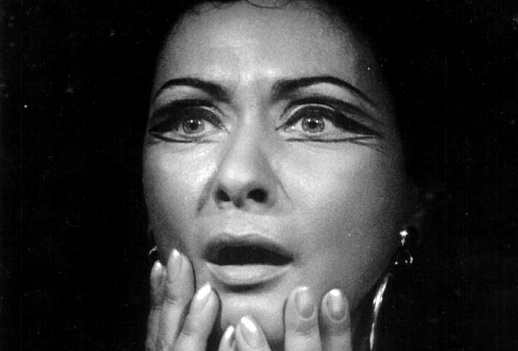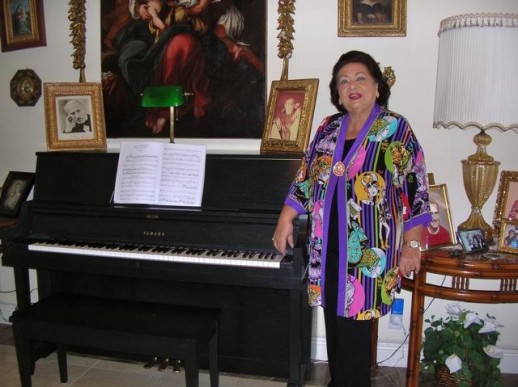
For Federico Fellini, she personified the beauty of the opera singer. Her career took to every major stage around the world where her calling card was Violetta, which she is estimated to have sung some 648 times (including the two occasions she sang at the Met, in November 1966.)
But her repertoire of 69 roles ranged from Donizetti’s Lucia to Wagner’s Senta. After quitting the stage, she became one of the most sought-after teachers at University of Indiana at Bloomington for a quarter of a century, together with her husband, basso Nicola Rossi-Lemeni.
And on Wednesday, the still-active, still radiant Virginia Zeani turns 90.
Luciano Pavarotti made his international debut beside her as one of her many Alfredos. Placido Domingo sang his first des Grieux to her Manon Lescaut. Joan Sutherland and Richard Bonynge told her, “You have no idea the profound impression you made on us. We had never heard in the flesh a bel canto soprano so opulent, so lush, and so velvety.”
Nelly Miricioiu commented, “The beauty and artistry of Virginia Zeani are legendary and in our world of easy personality, her humanity, kindness and modesty are always talked about and revered by her colleagues.” Fellow Romanian Angela Gheorghiu confessed, “She made a great impact on me. In her performances, she had the most beautiful and powerful voice, a wonderful technique, a marvelous range of colors, and a very strong force of interpretation.”
Teresa Stratas considers her the most beautiful Violetta she ever saw or heard, and wrote to her, “I can still feel the throb of your heart in that perfect vibrato. You enveloped us in your warm, liquid, even tone and drew us in to experience your joy and your heartbreak. Indescribable, really.”
Unfortunately Zeani made few commercial recordings, so we are lucky to have this document of her Aida from Teatro San Carlo in 1969, along with Gianfranco Cecchele, Grace Bumbry and Giangiacomo Guelfi.
Giuseppe Verdi: Aida
Teatro di San Carlo, Napoli
Fernando Previtali, conductor
18 May 1969
Aida – Virginia Zeani
Radamès – Gianfranco Cecchele
Amneris – Grace Bumbry
Amonasro – Giangiacomo Guelfi
Ramfis – Nicola Ghiuselev
Il Re d’Egitto – Enrico Campi
Una sacerdotessa – Eva Ruta
Un messaggero – Fernandino Jacopucci



